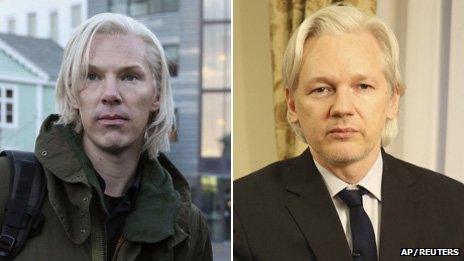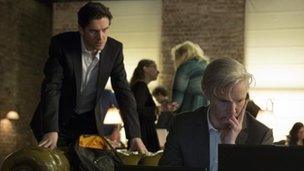Julian Assange refused to meet Benedict Cumberbatch, email reveals
- Published

Last month Cumberbatch (left) said he considered quitting the film after he received the email from Assange (right)
Julian Assange refused to meet Benedict Cumberbatch while he was preparing to play the WikiLeaks founder on film, a leaked email has revealed.
In the letter, sent in January, Assange described Cumberbatch's film, The Fifth Estate, as "toxic" and "distorted".
He also urged the actor: "Reconsider your involvement in this enterprise".
The Australian whistle-blower has been living at the Ecuadorean embassy in London after claiming asylum a year ago to avoid extradition to Sweden.
Released by Wikileaks, his email was written in response to the actor's request for a meeting, something Assange called "a bad idea".
"By meeting with you I would validate this wretched film," he wrote.
"I cannot permit this film any claim to authenticity or truthfulness. In its current form it has neither, and doing so would only further aid the campaign against me."
The Fifth Estate received a standing ovation at its world premiere during the Toronto Film Festival last month and is released this Friday 11 October in the UK and in the US next week.
It has received mixed reviews from critics, although they have been favourable towards Cumberbatch's performance.
Assange did praise Cumberbatch's previous work and said the two would "forever be correlated in the public imagination".
"I believe you are a good person, but I do not believe that this film is a good film," said Assange
"It is based on a deceitful book by someone who has a vendetta against me and my organisation."
The film draws on a memoir by former WikiLeaks spokesman Daniel Domscheit-Berg, Inside WikiLeaks: My Time with Julian Assange and the World's Most Dangerous Website.
It also uses material from WikiLeaks: Inside Julian Assange's War on Secrecy, by British journalists David Leigh and Luke Harding.
'Distorted truth'
Assange continued: "Feature films are the most powerful and insidious shapers of public perception, because they fly under the radar of conscious exclusion. This film is going to bury good people doing good work, at exactly the time that the state is coming down on their heads.
"It is going to smother the truthful version of events, at a time when the truth is most in demand.
"As justification it will claim to be fiction, but it is not fiction. It is distorted truth about living people doing battle with titanic opponents. It is a work of political opportunism, revenge and, above all, cowardice."
The email was published in full on a number of websites including Variety, external.
In comments accompanying the release of the letter, Assange said the DreamWorks film, directed by Bill Condon, was "a geriatric snoozefest that only the US government could love."

The film also stars Dan Stevens, who played Matthew Crawley in Downton Abbey
WikiLeaks angered the United States in 2010 by publishing hundreds of thousands of classified documents on the wars in Iraq and Afghanistan and US diplomatic cables.
In June 2012, Assange walked into the Ecuadorean embassy in London when his appeal against extradition to Sweden, for questioning on accusations of sex crimes, was turned down.
He denies the allegations and claims they are politically motivated, but Britain refuses to grant him safe passage out of the country, leaving him stuck inside the embassy.
In January's email Assange warned Cumberbatch: "You will be used, as a hired gun, to assume the appearance of the truth in order to assassinate it. To present me as someone morally compromised and to place me in a falsified history. To create a work, not of fiction, but of debased truth."
"Not because you want to, of course you don't, but because, in the end, you are a jobbing actor who gets paid to follow the script, no matter how debauched."
Cumberbatch revealed last month that he had considered quitting the movie after receiving the email, which he called a "considered, thorough, charming and intelligent account" of why he should not take part.
- Published9 October 2013
- Published6 September 2013
- Published4 September 2013
- Published21 August 2013